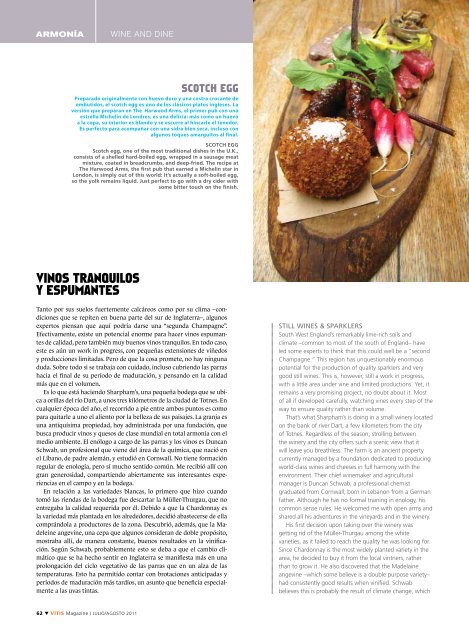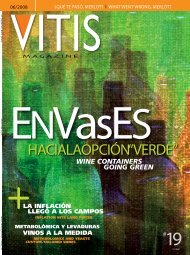VINOS DE PARRAS ANTIGUAS - Vitis Magazine
VINOS DE PARRAS ANTIGUAS - Vitis Magazine
VINOS DE PARRAS ANTIGUAS - Vitis Magazine
You also want an ePaper? Increase the reach of your titles
YUMPU automatically turns print PDFs into web optimized ePapers that Google loves.
armonía wine and dine<br />
SCOTCH EGG<br />
Preparado originalmente con huevo duro y una costra crocante de<br />
embutidos, el scotch egg es uno de los clásicos platos ingleses. La<br />
versión que preparan en The Harwood Arms, el primer pub con una<br />
estrella Michelin de Londres, es una delicia: más como un huevo<br />
a la copa, su interior es blando y se escurre al hincarle el tenedor.<br />
Es perfecto para acompañar con una sidra bien seca, incluso con<br />
algunos toques amarguitos al final.<br />
SCOTCH EGG<br />
Scotch egg, one of the most traditional dishes in the U.K.,<br />
consists of a shelled hard-boiled egg, wrapped in a sausage meat<br />
mixture, coated in breadcrumbs, and deep-fried. The recipe at<br />
The Harwood Arms, the first pub that earned a Michelin star in<br />
London, is simply out of this world: It’s actually a soft-boiled egg,<br />
so the yolk remains liquid. Just perfect to go with a dry cider with<br />
some bitter touch on the finish.<br />
<strong>VINOS</strong> TRANQUILOS<br />
Y ESPUMANTES<br />
Tanto por sus suelos fuertemente calcáreos como por su clima –condiciones<br />
que se repiten en buena parte del sur de Inglaterra–, algunos<br />
expertos piensan que aquí podría darse una “segunda Champagne”.<br />
Efectivamente, existe un potencial enorme para hacer vinos espumantes<br />
de calidad, pero también muy buenos vinos tranquilos. En todo caso,<br />
este es aún un work in progress, con pequeñas extensiones de viñedos<br />
y producciones limitadas. Pero de que la cosa promete, no hay ninguna<br />
duda. Sobre todo si se trabaja con cuidado, incluso cubriendo las parras<br />
hacia el final de su período de maduración, y pensando en la calidad<br />
más que en el volumen.<br />
Es lo que está haciendo Sharpham’s, una pequeña bodega que se ubica<br />
a orillas del río Dart, a unos tres kilómetros de la ciudad de Totnes. En<br />
cualquier época del año, el recorrido a pie entre ambos puntos es como<br />
para quitarle a uno el aliento por la belleza de sus paisajes. La granja es<br />
una antiquísima propiedad, hoy administrada por una fundación, que<br />
busca producir vinos y quesos de clase mundial en total armonía con el<br />
medio ambiente. El enólogo a cargo de las parras y los vinos es Duncan<br />
Schwab, un profesional que viene del área de la química, que nació en<br />
el Líbano, de padre alemán, y estudió en Cornwall. No tiene formación<br />
regular de enología, pero sí mucho sentido común. Me recibió allí con<br />
gran generosidad, compartiendo abiertamente sus interesantes experiencias<br />
en el campo y en la bodega.<br />
En relación a las variedades blancas, lo primero que hizo cuando<br />
tomó las riendas de la bodega fue descartar la Müller-Thurgau, que no<br />
entregaba la calidad requerida por él. Debido a que la Chardonnay es<br />
la variedad más plantada en los alrededores, decidió abastecerse de ella<br />
comprándola a productores de la zona. Descubrió, además, que la Madeleine<br />
angevine, una cepa que algunos consideran de doble propósito,<br />
mostraba allí, de manera constante, buenos resultados en la vinificación.<br />
Según Schwab, probablemente esto se deba a que el cambio climático<br />
que se ha hecho sentir en Inglaterra se manifiesta más en una<br />
prolongación del ciclo vegetativo de las parras que en un alza de las<br />
temperaturas. Esto ha permitido contar con brotaciones anticipadas y<br />
períodos de maduración más tardíos, un asunto que beneficia especialmente<br />
a las uvas tintas.<br />
62 ▼ <strong>Vitis</strong> <strong>Magazine</strong> l julio/agosto 2011<br />
STILL WINES & SPARKLERS<br />
south West england’s remarkably lime-rich soils and<br />
climate –common to most of the south of england– have<br />
led some experts to think that this could well be a “second<br />
Champagne.” this region has unquestionably enormous<br />
potential for the production of quality sparklers and very<br />
good still wines. this is, however, still a work in progress,<br />
with a little area under vine and limited productions. Yet, it<br />
remains a very promising project, no doubt about it. Most<br />
of all if developed carefully, watching vines every step of the<br />
way to ensure quality rather than volume.<br />
that’s what sharpham’s is doing in a small winery located<br />
on the bank of river Dart, a few kilometers from the city<br />
of totnes. regardless of the season, strolling between<br />
the winery and the city offers such a scenic view that it<br />
will leave you breathless. the farm is an ancient property<br />
currently managed by a foundation dedicated to producing<br />
world-class wines and cheeses in full harmony with the<br />
environment. their chief winemaker and agricultural<br />
manager is Duncan schwab, a professional chemist<br />
graduated from Cornwall, born in lebanon from a german<br />
father. although he has no formal training in enology, his<br />
common sense rules. he welcomed me with open arms and<br />
shared all his adventures in the vineyards and in the winery.<br />
his first decision upon taking over the winery was<br />
getting rid of the Müller-thurgau among the white<br />
varieties, as it failed to reach the quality he was looking for.<br />
since Chardonnay is the most widely planted variety in the<br />
area, he decided to buy it from the local vintners, rather<br />
than to grow it. he also discovered that the Madelaine<br />
angevine –which some believe is a double purpose variety–<br />
had consistently good results when vinified. schwab<br />
believes this is probably the result of climate change, which






